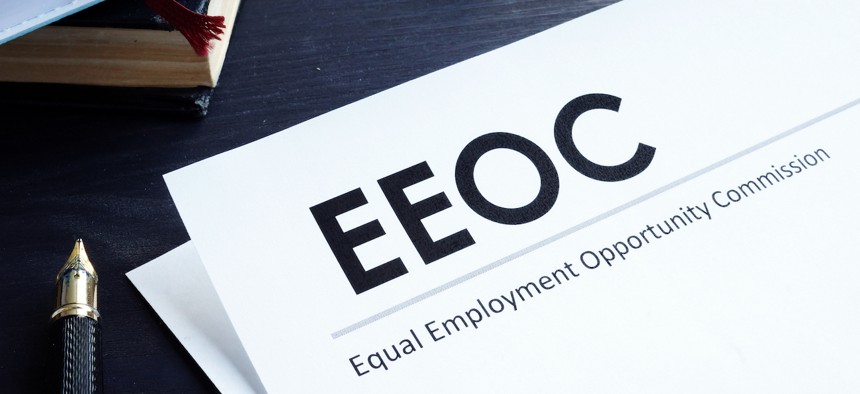
A “ban the box” policy was implemented across the federal government administratively in 2016. designer491/Getty Images
EEOC: ‘Ban the box’ policies are effective at federal agencies, but the government needs to raise awareness
In instances where a federal job applicant had a criminal record, the background check process only ruled them out over past criminal conduct 2% of the time, but many may still see their past as a barrier to joining the federal workforce.
The agency tasked with investigating claims of employment discrimination in the federal government this week said that policies barring or delaying agencies from examining job applicants’ criminal history work well, but need to do more to ensure affected applicants know their rights.
The Equal Employment Opportunity Commission on Tuesday issued a pair of reports analyzing the impact of so-called “ban the box” policies—that is, policies that delay employers from asking job applicants if they have a criminal history—on federal agencies’ hiring practices.
Such a policy was implemented across the federal government administratively in 2016 and was codified and expanded to include contractors when former President Trump signed the Fair Chance to Compete Act into law in 2019. The Office of Personnel Management this month issued final regulations implementing the law.
EEOC’s reports are split between studying the likelihood that people with criminal histories are to work for the federal government and examining how often background checks during the federal hiring process find “criminal conduct issues” and whether that information leads to agencies rescinding a preliminary job offer.
Using a subset of data from the National Science Foundation’s Panel Study of Income Dynamics, EEOC found that people with prior criminal records were nearly half as likely to be federal workers compared to those without a record, though the survey does not have enough data to assess the causes of that disparity.
“It is possible that people with incarceration records erroneously believe they are barred from federal employment and self-select out of the applicant pool,” the agency wrote. “It is also possible that hiring managers are less likely to hire applicants with any kind of record—incarceration, arrest or conviction. Additional research directly examining the hiring practices of federal agencies towards workers with a record is necessary to better understand how employment for these community members could be increased.”
On the other side of the hiring process, EEOC found that the federal government’s policies delaying when agencies can ask about applicants’ criminal history are relatively successful in ensuring applicants have a fair shot at federal jobs regardless of whether they have a criminal record.
Using data covering the 2018-2020 fiscal years, EEOC determined that 22.3% of background investigations for positions in the federal civil service found criminal conduct issues. Of those instances, only 2% led to an “unfavorable” determination that led to the candidate not being hired.
But despite such a small number of applicants receiving an “unfavorable” determination following their background check, only 76% of civil service adjudications resulted in favorable determinations, at least in part because when criminal conduct was an issue, applicants were more likely to withdraw their applications, resign or be removed before a determination could be made, with 21.7% of them doing so, compared to only 14.5% government-wide.
“If a preponderance of these cases is due to withdrawn applications, the length of the adjudication process should be examined,” EEOC wrote. “If pre-appointment adjudications are too long in duration, they may result in applicants accepting other positions. If a preponderance of these cases is due to resignations, exit interview and exit survey data should be examined to determine why appointees are separating from federal positions before their adjudications are complete.”
EEOC recommended that the rest of the government “widely publicize” the two reports, particularly the finding that agencies are hiring people despite criminal histories appearing in their background checks to change the perception that the formerly incarcerated can’t find jobs in the federal government. And the agency said it hopes to conduct more research in conjunction with the Office of Personnel Management and the Defense Counterintelligence and Security Agency, which conducts background checks as part of the federal hiring process.
“A lack of available data constrains the ability to measure the relative rate of federal employment for formerly incarcerated workers and those with prior arrests and convictions,” EEOC wrote. “As such, one high-value policy would be to track the number and performance of federal workers with arrest/conviction records and flagged credit issues over time . . . Specifically, if DCSA could generate the proportion of federal employees that had a background check return arrest or conviction information compared to the total current federal workforce, these statistics would be helpful to the EEOC.”







